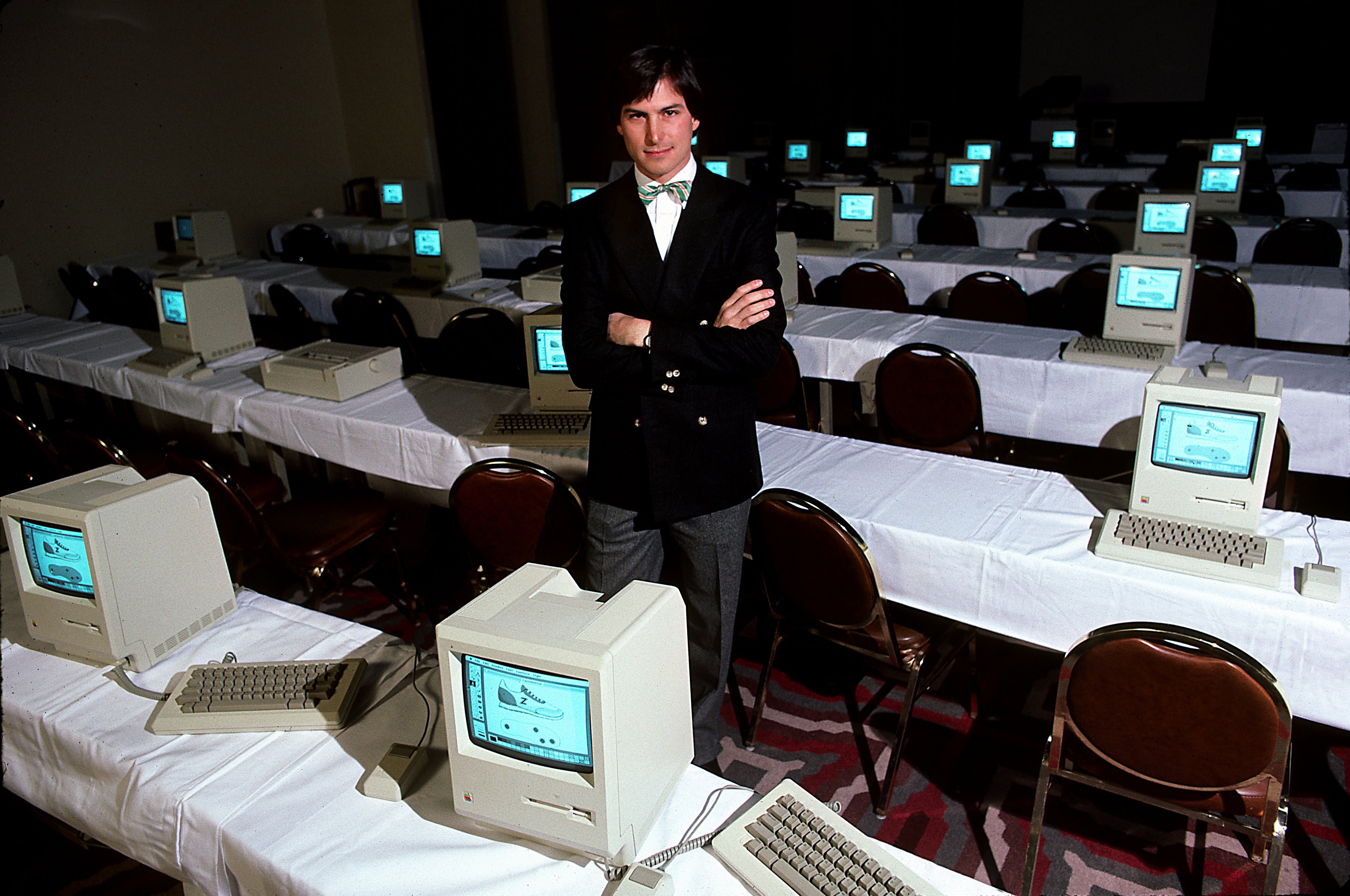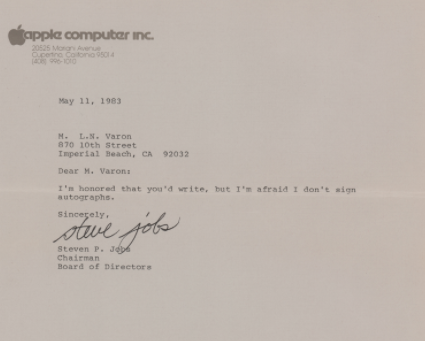Auction over Steve Jobs' Atari job application stopped amid disarray
The original letter for sale also came with an NFT for some reason.

Keep up to date with the most important stories and the best deals, as picked by the PC Gamer team.
You are now subscribed
Your newsletter sign-up was successful
Want to add more newsletters?

Every Friday
GamesRadar+
Your weekly update on everything you could ever want to know about the games you already love, games we know you're going to love in the near future, and tales from the communities that surround them.

Every Thursday
GTA 6 O'clock
Our special GTA 6 newsletter, with breaking news, insider info, and rumor analysis from the award-winning GTA 6 O'clock experts.

Every Friday
Knowledge
From the creators of Edge: A weekly videogame industry newsletter with analysis from expert writers, guidance from professionals, and insight into what's on the horizon.

Every Thursday
The Setup
Hardware nerds unite, sign up to our free tech newsletter for a weekly digest of the hottest new tech, the latest gadgets on the test bench, and much more.

Every Wednesday
Switch 2 Spotlight
Sign up to our new Switch 2 newsletter, where we bring you the latest talking points on Nintendo's new console each week, bring you up to date on the news, and recommend what games to play.

Every Saturday
The Watchlist
Subscribe for a weekly digest of the movie and TV news that matters, direct to your inbox. From first-look trailers, interviews, reviews and explainers, we've got you covered.

Once a month
SFX
Get sneak previews, exclusive competitions and details of special events each month!
Before becoming synonymous with fruit and turtlenecks, Steve Jobs spent a brief spell at Atari, which at the time was the biggest videogame company in the world. Hired by the legendary Al Alcorn—best-known for creating Pong—in 1974, when he was only 18, Jobs became Atari employee number 40. Appropriately enough, the most infamous story from his time there is how he got Steve Wozniak to do all the heavy lifting on reducing Breakout's chip usage, then diddled Woz on the money received as a reward.
Jobs didn't stay at Atari long, heading off to India to seek spiritual enlightenment after six months, then returning in 1975 before leaving to establish Apple on January 1, 1976 (he offered Atari CEO Nolan Bushnell 1/3rd of Apple for $50,000; Bushnell turned it down). But it's a noteworthy part of his career—he was, by all accounts, a scruffy and rather fragrant hippy trying to find his way, and a big tech company took a punt on him.
This is why there was considerable interest around an auction for what purported to be Steve Jobs' application to join Atari in 1973 (thanks, iMore). The original letter was to be accompanied by an NFT of the letter—inexplicably—in RR Auction's 'The Steve Jobs Revolution: Engelbart, Atari, and Apple'.
The now-suspended listing read:
Incredible Atari job application questionnaire filled out and signed by Steve Jobs, one page, 8.5 x 11, annotated 1973 in another hand. Jobs fills out the document with his name, "Steven jobs"; address, "reed college"; phone, "none"; and major, "english lit." In the middle section, he writes "yes" in response to 'Driver's License?' and "possible, but not probable," in reply to 'Access to transportation?' With regard to his skills, next to 'Computer' and 'Calculator,' he writes, "yes (design, tech)." At the bottom, he describes his 'Special Abilities' as "electronics tech or design engineer. digital.-from Bay near Hewitt-Packard [sic]." In very good condition, with intersecting folds, overall creasing, light staining, and some old clear tape to the top edge.

The same auction that has seen this lot withdrawn also sold a letter in which Jobs says he doesn't do autographs for an astonishing $479,939. The joke is, he signs it with a flourish. Which is funny but come on: nothing's this funny.
RR Auction has now removed the item, and confirmed to iMore that this is due to newly raised doubts about whether it is, in fact, Jobs' application to Atari. The authenticity of the item is not in doubt—that is, this is definitely a form filled-in by Steve Jobs—but the suggestion is now that it originates from a part-time job at Reed College's psych lab which Jobs held in 1973. The letter is dated 1973 and Jobs joined Atari in 1974.
RR Auction VP Bobby Livingston confirmed that an "interested client" had discovered the information about Job's part-time work at Reed College, where he spent his time repairing lab equipment. The issue seems to be that people just weren't super-aware that Jobs had this... job. As such, this letter's relation to Atari is now an open question.
Keep up to date with the most important stories and the best deals, as picked by the PC Gamer team.
This is particularly surprising in light of the fact that it has previously been sold without such questions over its provenance. The current owner bought it at Bonhams in July 2021 for $343,000 (and the NFT for $27,000), where it was sold as the Atari application and described as a piece of history "from the exact moment that a dreamer changed the world."
When a guy got a part-time gig to make some dough just doesn't have the same ring to it, I suppose.
To be clear: this could still turn out to be linked to Atari. Indeed, one of the additional confusions is that it comes with a letter of authenticity signed by Allan Alcorn, who hired Jobs. However, the sale has been stopped for the moment while further investigations try to determine the truth.
Items like these are valued primarily on their links to history, and Jobs memorabilia is a hugely speculative market. This is a Steve Jobs job application, and as such will have value for collectors of all stripes. But the difference between Atari and Reed College could very well have expensive consequences for the current owner.

Rich is a games journalist with 15 years' experience, beginning his career on Edge magazine before working for a wide range of outlets, including Ars Technica, Eurogamer, GamesRadar+, Gamespot, the Guardian, IGN, the New Statesman, Polygon, and Vice. He was the editor of Kotaku UK, the UK arm of Kotaku, for three years before joining PC Gamer. He is the author of a Brief History of Video Games, a full history of the medium, which the Midwest Book Review described as "[a] must-read for serious minded game historians and curious video game connoisseurs alike."


